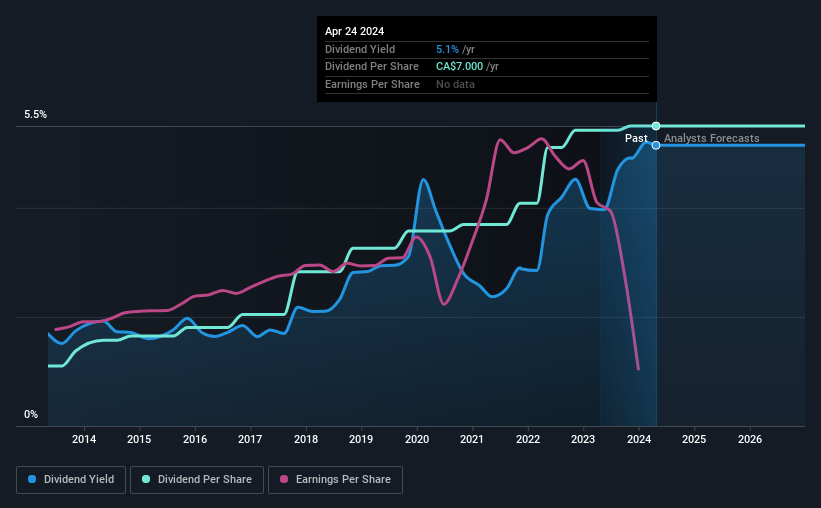Here's Why We're Wary Of Buying Canadian Tire Corporation's (TSE:CTC.A) For Its Upcoming Dividend
Regular readers will know that we love our dividends at Simply Wall St, which is why it's exciting to see Canadian Tire Corporation, Limited (TSE:CTC.A) is about to trade ex-dividend in the next 3 days. The ex-dividend date is one business day before the record date, which is the cut-off date for shareholders to be present on the company's books to be eligible for a dividend payment. The ex-dividend date is important as the process of settlement involves two full business days. So if you miss that date, you would not show up on the company's books on the record date. Thus, you can purchase Canadian Tire Corporation's shares before the 29th of April in order to receive the dividend, which the company will pay on the 1st of June.
The company's upcoming dividend is CA$1.75 a share, following on from the last 12 months, when the company distributed a total of CA$7.00 per share to shareholders. Based on the last year's worth of payments, Canadian Tire Corporation stock has a trailing yield of around 5.1% on the current share price of CA$136.03. Dividends are an important source of income to many shareholders, but the health of the business is crucial to maintaining those dividends. So we need to check whether the dividend payments are covered, and if earnings are growing.
See our latest analysis for Canadian Tire Corporation
Dividends are usually paid out of company profits, so if a company pays out more than it earned then its dividend is usually at greater risk of being cut. Canadian Tire Corporation distributed an unsustainably high 183% of its profit as dividends to shareholders last year. Without extenuating circumstances, we'd consider the dividend at risk of a cut. Yet cash flow is typically more important than profit for assessing dividend sustainability, so we should always check if the company generated enough cash to afford its dividend. It paid out more than half (53%) of its free cash flow in the past year, which is within an average range for most companies.
It's good to see that while Canadian Tire Corporation's dividends were not covered by profits, at least they are affordable from a cash perspective. Still, if the company repeatedly paid a dividend greater than its profits, we'd be concerned. Very few companies are able to sustainably pay dividends larger than their reported earnings.
Click here to see the company's payout ratio, plus analyst estimates of its future dividends.
Have Earnings And Dividends Been Growing?
When earnings decline, dividend companies become much harder to analyse and own safely. If earnings decline and the company is forced to cut its dividend, investors could watch the value of their investment go up in smoke. With that in mind, we're discomforted by Canadian Tire Corporation's 19% per annum decline in earnings in the past five years. Ultimately, when earnings per share decline, the size of the pie from which dividends can be paid, shrinks.
Another key way to measure a company's dividend prospects is by measuring its historical rate of dividend growth. Since the start of our data, 10 years ago, Canadian Tire Corporation has lifted its dividend by approximately 17% a year on average. That's intriguing, but the combination of growing dividends despite declining earnings can typically only be achieved by paying out a larger percentage of profits. Canadian Tire Corporation is already paying out 183% of its profits, and with shrinking earnings we think it's unlikely that this dividend will grow quickly in the future.
Final Takeaway
Has Canadian Tire Corporation got what it takes to maintain its dividend payments? Earnings per share have been in decline, which is not encouraging. Additionally, Canadian Tire Corporation is paying out quite a high percentage of its earnings, and more than half its cash flow, so it's hard to evaluate whether the company is reinvesting enough in its business to improve its situation. Bottom line: Canadian Tire Corporation has some unfortunate characteristics that we think could lead to sub-optimal outcomes for dividend investors.
Having said that, if you're looking at this stock without much concern for the dividend, you should still be familiar of the risks involved with Canadian Tire Corporation. For instance, we've identified 4 warning signs for Canadian Tire Corporation (1 is significant) you should be aware of.
If you're in the market for strong dividend payers, we recommend checking our selection of top dividend stocks.
Have feedback on this article? Concerned about the content? Get in touch with us directly. Alternatively, email editorial-team (at) simplywallst.com.
This article by Simply Wall St is general in nature. We provide commentary based on historical data and analyst forecasts only using an unbiased methodology and our articles are not intended to be financial advice. It does not constitute a recommendation to buy or sell any stock, and does not take account of your objectives, or your financial situation. We aim to bring you long-term focused analysis driven by fundamental data. Note that our analysis may not factor in the latest price-sensitive company announcements or qualitative material. Simply Wall St has no position in any stocks mentioned.

 Yahoo Finance
Yahoo Finance 
